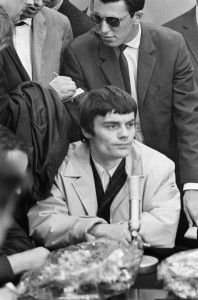James George Nicol (born 3 August 1939), better known as Jimmie Nicol or Jimmy Nicol, is a British drummer and business entrepreneur. He is best known for temporarily replacing Ringo Starr in The Beatles for a series of concerts during the height of Beatlemania in 1964, elevating him from relative obscurity to worldwide fame and then back again in the space of a fortnight. Nicol had hoped that his association with The Beatles would greatly boost his career but instead found that the spotlight moved away from him once Starr returned to the group. His subsequent lack of commercial success led him into bankruptcy in 1965. After then working with a number of different bands, including a successful stint with The Spotnicks, he left the music business in 1967 to pursue a variety of entrepreneurial ventures. Over the decades, Nicol has increasingly shied away from media attention, preferring not to discuss his connection to The Beatles nor seek financial gain from it. He has a son, Howard, who is a BAFTA award-winning sound engineer.
When Ringo Starr collapsed with tonsillitis and was hospitalised on 3 June 1964, the eve of The Beatles’ 1964 Australasian tour, the band’s manager Brian Epstein and their producer George Martin urgently discussed the feasibility of using a stand-in drummer rather than cancelling part of the tour. Martin suggested Jimmie Nicol as he had recently used him on a recording session with Tommy Quickly. Nicol had also drummed on a ‘Top Six’ budget label album as part of an uncredited session band, as well as an extended play single (with three tracks on each side) of Beatles cover versions (marketed as ‘Teenagers Choice’ and entitled Beatlemania) which meant that he already knew the songs and their arrangements. Producer Bill Wellings and the aforementioned Shubdubs trumpeter Johnny Harris (freelancing here as an arranger and composer) were responsible for putting together alternative budget cover versions of songs taken from the British Hit Parade aimed at cash-strapped teenagers. Harris said: ‘The idea was for me to try and guess which six songs would be topping the charts about a month ahead. I would do the arrangements and then go into the studio and record “sound a-likes”; the first EP (extended play) released got to number 30 in the charts. Jimmie was on drums and, as you can imagine, we covered a lot of the Beatles’ songs.’ Although John Lennon and Paul McCartney quickly accepted the idea of using an understudy George Harrison threatened to pull out of the tour telling Epstein and Martin: ‘If Ringo’s not going, then neither am I. You can find two replacements.’ Martin recalled: ‘They nearly didn’t do the Australia tour. George is a very loyal person. It took all of Brian’s and my persuasion to tell George that if he didn’t do it he was letting everybody down.’ Tony Barrow, who was The Beatles’ press officer at the time, later commented: ‘Brian saw it as the lesser of two evils; cancel the tour and upset thousands of fans or continue and upset the Beatles.’ Ringo: ‘It was very strange, them going off without me. They’d taken Jimmie Nicol and I thought they didn’t love me any more – all that stuff went through my head.’ The arrangements were made very quickly, from a telephone call to Nicol at his home in West London inviting him to attend an audition-rehearsal at Abbey Road Studios, to packing his bags, all in the same day. At a press conference a reporter mischievously asked John Lennon why Pete Best, who had been The Beatles’ previous drummer for two years but dismissed by the group on the eve of stardom, was not being given the opportunity of replacing Ringo, to which Lennon replied: ‘He’s got his own group [Pete Best & the All Stars], and it might have looked as if we were taking him back, which is not good for him.’ Later, on the subject of remuneration, Nicol recalled: ‘When Brian [Epstein] talked of money in front of them [Lennon, McCartney and Harrison] I got very, very nervous. They paid me £2,500 per gig and a £2,500 signing bonus. Now, that floored me. When John spoke up in a protest by saying “Good God, Brian, you’ll make the chap crazy!”, I thought it was over. But no sooner had he said that when he said, ‘Give him ten thousand!’ Everyone laughed and I felt a hell of a lot better. That night I couldn’t sleep a wink. I was a fucking Beatle!’ These sums of money, which were vast in 1964, are unverified.
Visit site: https://en.wikipedia.org/wiki/Jimmie_Nicol



